
Of this last session at Florence the principal labour was the Act embodying the Papal guarantees which was intended to safeguard the legitimate independence and decorum of the Holy See on the lines formerly advocated by Cavour.

54mm m.b miniatures franco prussian war
Neither extreme party was satisfied, but it seemed at first not unlikely that the Pope would tacitly acquiesce in the arrangement. The first monthly payment of the national dotation, calculated to correspond with his civil list, was accepted.

But though the influence of Cardinal Antonelli and the Italian prelates had been sufficient to keep the Pope in Rome, the influence of those who wished him to leave it was strong enough to establish at the Vatican the intransigent policy which has been pursued till now.
During the flood of the Tiber which devastated the city that winter, the King of Italy paid a first informal visit to his capital, accompanied only by a few attendants, and bent on bringing help to the suffering population. In July 1872, he made his solemn entry, and at the same time the seat of Government was transferred to the Eternal City.

garibaldi on the tiber inspecting the damage
Victor Emmanuel could say what few men have been able to say of so large a promise: 'I have kept my word.' He gathered up the Italian flag from the dust of Novara, and carried it to the Capitol.But forgot to say that without Napoleon the third all would have been in vain whatever had been the negative aspects of the Emperor.
 Cavalry jacket from the Franco Prussian .No its not , Uwe put in a comment saying its an 1809 uniform from the Bavarian cavalry.Sorry!!!!!!
Cavalry jacket from the Franco Prussian .No its not , Uwe put in a comment saying its an 1809 uniform from the Bavarian cavalry.Sorry!!!!!!In spite of the grandeur of republican tradition in Italy, and the lofty character of the men who represented it during the struggle for unity, a study of these events leaves on the mind the conviction that the country could neither have been freed from the invader nor welded into a single body-politic without a symbol which appealed to the imagination, and a centre of gravity which kept the diverse elements together by giving the whole its proper balance.

The Liberating Prince whom Machiavelli thought to have been found in the Savoyard King. 'Quali porte se gli serrerebbono? Quali popoli gli negherebbono la obbedienza? Quale invidia se gli opporrebbe? Quale Italiano gli negherebbe l'ossequio?' To fill the appointed part Victor Emmanuel possessed the supreme qualification, which was patriotism.

Armies in plastic Franco-Prussian war
But the real symbol had always been the Garibaldian and their leader and without Garibaldi there would have been no real rising against the Austrians.Risings are made by the middle class and the ones that enforce are the peasants.

Jealousy, such is the Italians worse trait always took hold.The General had kept the fire hot when others had decided enough was enough, he alone carried the war to the foe and others followed his courage as well as being green with envy. He may have made mistakes but they were honest ones.Nevertheless he was not liked by many. The doer is often disliked by the mouse.

www.Junior General.great site for paper soldiers
Though the King came of an ambitious race, not even his enemies could with any seriousness bring to his charge personal ambition, since every step which took him further from the Alps, his fathers' cradle, involved a sacrifice of tastes and habits, and of most that made life congenial. But he was ambitious and therefore saw himself as a real leader of men.
When his work was finished, though he was not old, he had the presentiment that he should not long survive its completion. And so it proved.

franco prussian war print
In the first days of January 1878, the King was seized with one of those attacks on the lungs which his vigorous constitution had hitherto enabled him to throw off. But in Rome this kind of illness is more fatal than elsewhere, and the doctors were soon obliged to tell him that there was no hope. 'Are we come to that?' he asked; and then directed that the chaplain should be summoned.(below 54mm Hinton hunt prussian war inf)

There was no repetition of the scene at San Rossore; the highest authority had already sanctioned the administration of the Sacraments to the dying King, nay, it is said that the Pope's first impulse was to be himself the bearer of them.

San Rossore.The hunting grounds of the kings of Italy
At that hour the man got the better of the priest; Francis drove out Dominic. The heart that had been made to pity and the lips that had been formed to bless returned to their natural functions. When the aged Pius heard that all was over, exclaimed: 'He died like a Christian, a Sovereign and an honest man (galantuomo).' Very soon the Pope followed the King to the grave, and so, almost together, these two historical figures disappear.
Six years before, solitary and unsatisfied, Mazzini died at Pisa,
 the death of mazzini by lega
the death of mazzini by legahis heart gnawed with the desire of the extreme, as the hearts have been of all those who aspired less to change what men do, or even what they believe, than what they are. More deep than political regrets was the pain with which he watched the absorption of human energies, in the race for wealth, for ease, for material happiness; he discerned that if the egotism of capital led to oppression, the egotism of labour would lead to anarchy.

these models from divinia hill would be easy to convert into soldiers of our period. You could easily put kepis on these or you could look at the other pieces from Divinia Hill and use more elaborate "spares".
To the end he preached the moral law of which he had been the apostle through life. His last message to his countrymen, written when the pen was falling from his hand, was a warning to Italian workingmen to beware of the false gods of the new socialism. When others saw darkness he saw light; now, Cassandra-like, he saw darkness when others saw light; yet he did not doubt the ultimate triumph of the light, but he no longer thought that his eyes would see it, and he was glad to close them.
 these are easily converted into franco prussian war lancers
these are easily converted into franco prussian war lancersGaribaldi continued his career as a general by commanding Italian troops, with some success, during the Austro-Prussian war of 1866, which resulted in Austria ceding Venetia to the kingdom of Italy
.Garibaldi wrote a letter to the government of the new republic offering, “what is left of me.” The French were reluctant at first to accept his offer, “but help from such a distinguished source could not be rejected.”

Garibaldi arrived in Marseilles on November 7, 1870, to a cool reception. The French commanders were unsure of the wisdom in bringing on Garibaldi, as well as harboring old feelings of distrust, as they had been enemies until a short time ago. Garibaldi was initially put in charge of a few hundred Italian volunteers, but after much arguing took command of 5,000-15,000 men.
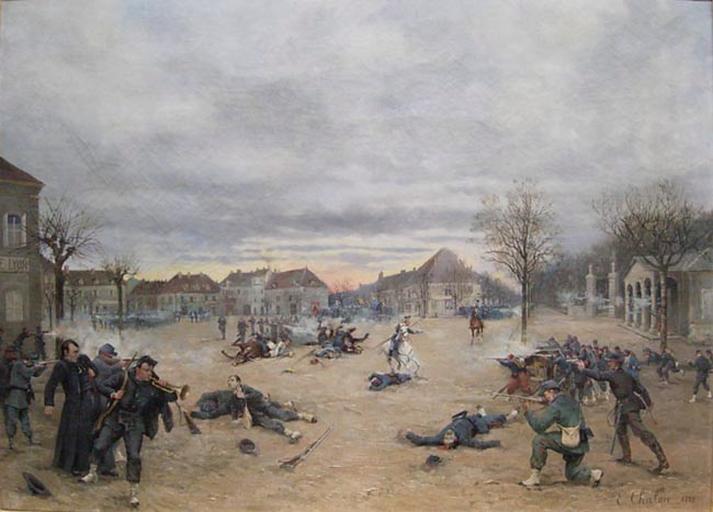
 after the demise of France's main armies, the leaders of the new republic began to consider the use of guerrilla warfare .These were to be a auxiliary to the newly formed Army of the Loire . There was guerrilla activity against the Germans by a parts of the French population even before the new governments' consideration of a guerrilla war and became a serious problem for the Germans in Alsace. At first these guerrilla's sprang up on their own in local communities and joined by foreigners, such as
after the demise of France's main armies, the leaders of the new republic began to consider the use of guerrilla warfare .These were to be a auxiliary to the newly formed Army of the Loire . There was guerrilla activity against the Germans by a parts of the French population even before the new governments' consideration of a guerrilla war and became a serious problem for the Germans in Alsace. At first these guerrilla's sprang up on their own in local communities and joined by foreigners, such as Garibaldi who went to France and assumed command of the Army of the Vosges(below), an army of volunteers that was never d
 efeated by the Germans.
efeated by the Germans.The volunteers included men from Poland, Italy, Ireland, England, Spain and America. The Army also included Frenchmen who were loyal to their country, but uninterested in the constraints that joining the regular army would have brought about. These men were often members of a francs-tireur, guerrilla forces that fought outside the scope of the regular army.
 francs tirelleur
francs tirelleurThe Army was organized into four brigades, “the first commanded by General Bossack, the second by Colonel Delpeck, … and the third by Menotti [Garibaldi, Giuseppe's son].”

The campaign started out impressively enough. On November 14, 1870, a small force led by Ricciotti Garibaldi surprised a Prussian force of one thousand men at Châtillon and won the day. Giuseppe issued an order of the day detailing this victory.
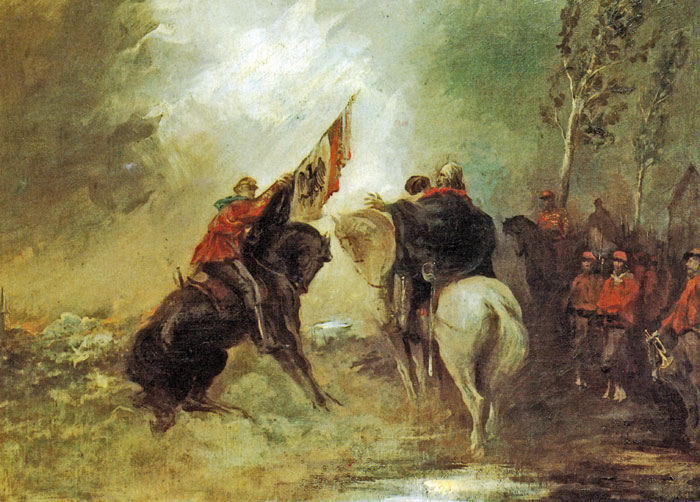
garibaldi and son near chatilon
The francs-tireurs of the Vosges, the chasseurs of the Isère, the (Savoyard) chasseurs of the Alps(below), the battalion of the Doubs, and the Hâvre chasseurs, all of whom, under the direction of Ricciotti Garibaldi, have taken part in the affair at Châtillon, have deserved well of the Republic.

Being only 400 strong, they attacked about 1000 men, defeated them, made 167 prisoners (including 13 officers), and took eighty-two saddled horses, four fourgons of arms and ammunition, and the mail waggon.(sic) On our side there were six men killed, and twelve wounded; the enemy had more.
While this was great news to the army at large, it would prove to be a problem for Garibaldi’s men. With such an astonishing victory over a superior force, the army developed a false sense of security.

For the rest of the Army of the Vosges, the campaign started a few days later in November 1870. The city of Dijon was under siege by the Prussian army, so Garibaldi and his men set out for Dijon, intent on helping the citizens defend their city. Just a few short miles from the city, the army received word that the city had surrendered. Upon hearing the news, the army headed back towards Autun(below).
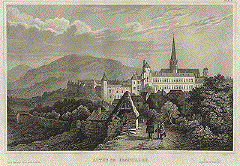
On the march back, Garibaldi began to consider returning to Dijon in an attempt to regain control from the Prussians. He felt that attacking at night would minimize the effect of the Prussians far larger numbers. As the army headed towards Dijon, they passed through Lantenay, where, standing atop a plateau, they spotted a contingent of the Prussian army headed their way from Dijon. Garibaldi and his officers decided that this was their chance to make an impact.

they prepared the field of battle to their advantage and waited. Once the Prussians were within range, the army began to fire on the Prussians, who, caught by surprise, fought for a moment then retreated. Sensing victory, Garibaldi pursued the retreating army all the way back to Dijon.
Shrimps with Dijon mustard

Directions
 memorial near metz
memorial near metzThe Prussians arrived at Autun and laid siege to the city. Just as it appeared that all hope was lost, General Carl Wilhelm von Werder recalled his troops to Dijon. General von Werder had noticed a build up of French troops near Dijon and therefore wanted the army back to help defend the city. This was not to be however, as shortly after the arrival of the army to Dijon, in late December, von Werder ordered that the city be evacuated.

With the Prussian army gone from Autun, the Army of the Vosges had precious time to recoup and recover. In addition to the rest, the time also gave the to Army time to plan. It was decided that the Army, along with other French forces, would return to Dijon, now unoccupied, and hold the city once more. Due to the winter weather, getting the Army to Dijon took some time.
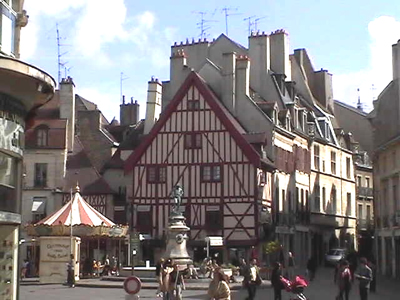
dijon
The battle for the Army of the Vosges resumed on January 21, 1871. The Prussians attacked Dijon from the West in great numbers; however, the French had been preparing and the defenses of the city were well in place. The two armies went back and forth for three days, each time one army made headway, the opposing army would push back, gaining ground. On the fourth day, The Prussian army pulled back and the fighting ceased for a while.

church near metz . its important to study the regional differences in dwellings and buildings to get the correct feel for the times if creating wargaming stuff
http://maxted/ Travels with Modestine 2=good blog on the area
 near Metz. It would be a nice touch on a wargames table
near Metz. It would be a nice touch on a wargames tableThe fighting renewed the next day and continued sporadically until January 31, 1871. At this point, the Army of the Vosges was tired and had taken many casualties. Because of this, the Army of the Vosges pulled out of Dijon and retreated to Courcelles. The Prussians once again held Dijon, beginning the morning of February 1, 1871.

"The French government surrendered Paris to the German army at the end of January, and brought the war to a close." They were humbled in the greatest way and shown to be the incompetants that they really were, in fact a league of incomparable incompetants with Austria and Italy featuring too.

Most of the battles were based on who makes the most mistakes.Magenta and solferino, like that but now they had met the Barcelona of european armies and were shown up for what they were.
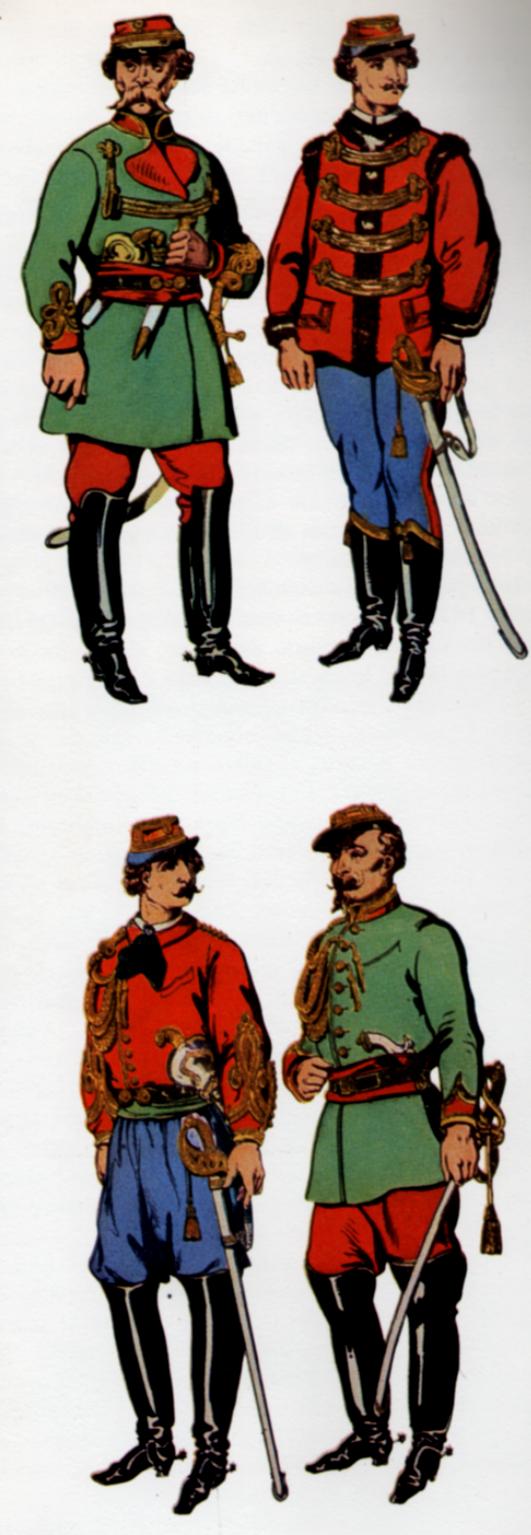 Army of Garibaldi in France
Army of Garibaldi in FranceThe Army disbanded and Giuseppe Garibaldi was elected to serve in the National Assembly of Dijon. Garibaldi wanted to attend and speak at the first meeting of the National Assembly; however, he was shouted down by french who still showed arrogance despite and in the face of abject humiliation from the germanics, disgusted swith these ants of men he therefore resigned his seat and returned to Italy.
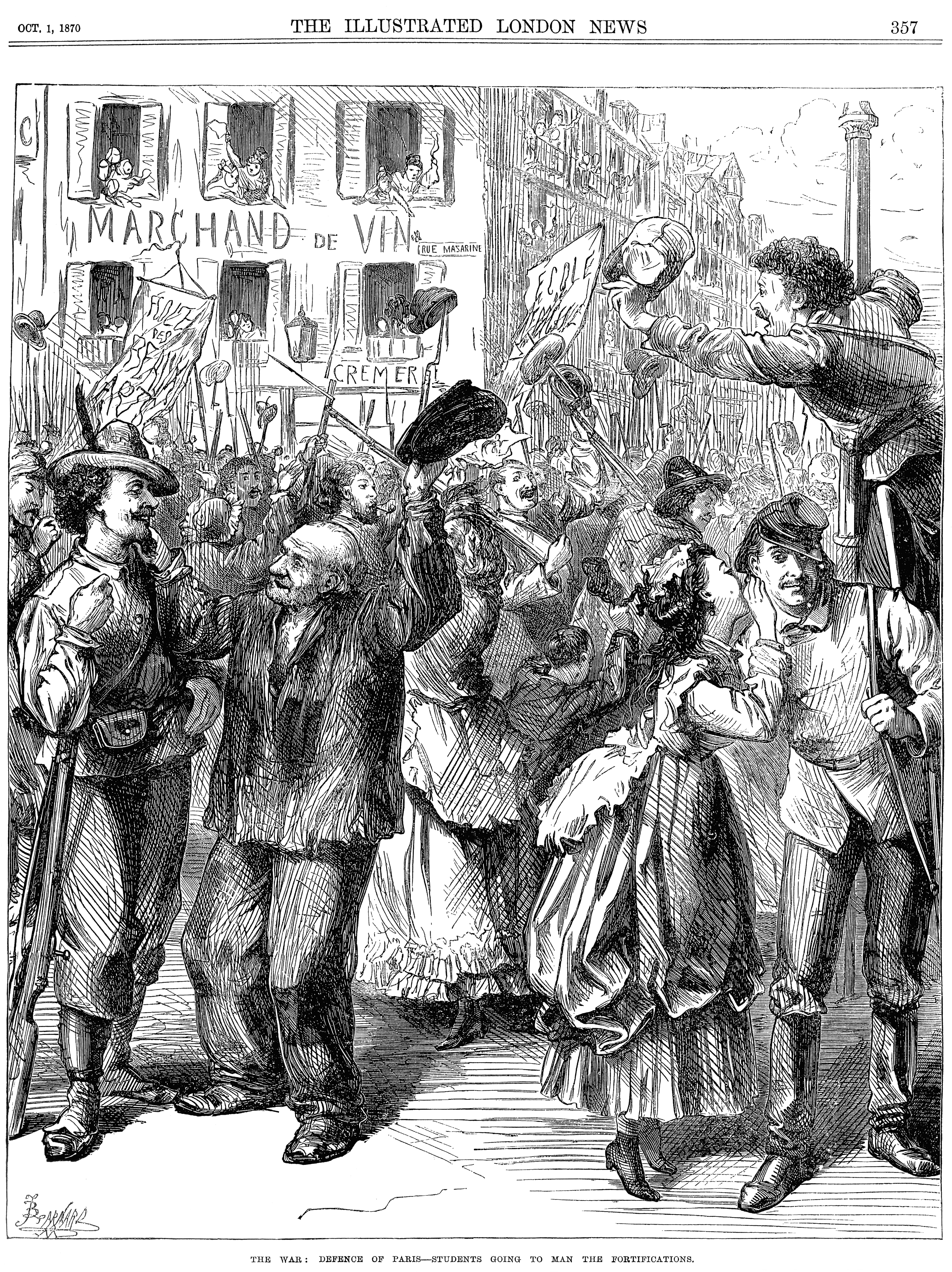
After the latter, Garibaldi's long career as a soldier came to an end. After serving some years as a deputy for Rome in the Italian parliament, he spent his last years on a farm in Caprera writing novels.

Less sad, notwithstanding his physical martyrdom, were Garibaldi's last years. Italy showed him an unforgetting love; when he came to the continent, the same multitudes waited for him as of old, but instead of cheers there was a not less impressive silence now, lest the invalid should be disturbed.
Soon after the transfer of the capital he went to Rome to speak in favour of the works by which it was proposed to control the inundations of the Tiber, and it was curious to hear it said on all sides that, of course, the Tiber works must be taken in hand as Garibaldi wished it.
Pius IX. summed up the situation wittily in the remark: 'Lately we were two here; now we are three.' The old hero invoked the day when bayonets might be turned into pruning-hooks, but he by no means thought that it had arrived, and in the meanwhile he urged the Italians to look to their defences, and above all, 'to be strong on the sea, like England.' In the matter of government he remained the impenitent advocate of the rule of one honest man—call him Dictator or what you please, so he be one! Garibaldi died at Caprera on the 2nd of June 1882. The play was ended, the actors vanished:the stage was bare .Exits and entrances, entrances and exits.
 militia in paris
militia in parisA new epoch has begun which need not detain the chronicler of Italian Liberation. The prose of possession succeeds the poetry of desire. Nothing, however, can lessen the greatness of the achievement. With regard to the future, it may be allowable to recall the superstition which, like so many other seemingly meaningless beliefs, becomes full of meaning when read according to the spirit: that a house stands long if its foundations be watered with the blood of sacrifice. No work of man was ever watered with a stranger blood than the restoration of Italy to the ranks of living nations. And all countries and nations should never forget that you will not be thanked if you come to the aid of Italy as Napoleon found and later the British army in the campaign of Italy
 from the recent film "We Believed " one of the most badly cut films in history. The story of Cristina
from the recent film "We Believed " one of the most badly cut films in history. The story of CristinaAnd we should not forget the thanks given by Italian heads of state to the woman who had really started the rising against the Austrians in 48 and before. The thanks were nothing and no one of government attended her funeral.
Cristina Trivulzio was the daughter of Jerome Trivulzio and the Marquises Gherardini. Her father died soon after her birth and her mother remarried to Alessandro Visconti of Aragon; she had a stepbrother and three stepsisters through this second marriage. By her own account "I was as a child melancholy, serious, introverted, quiet, so shy that I often happen to burst into tears in the living room of my mother because I realized that I was being looked at or that they wanted me to talk."

She married at 16, at the Church of St. Fedele in Milan on 24 September 1824. She was considered the richest heiress in Italy, with a dowry of 400,000 francs. Her libertine husband, Prince Emilo Barbiano di Belgioioso, caused a separation soon after and also gave her syphillis straight away. They did not divorce and remained on cordial terms throughout their lives.One wonders how true this was though that they livred cordially for that type of sexual disease

She had began associating with Mazzinian revolutionaries through her art teacher Ernesta Bisi and stepfather Marquis Alessandro Visonte d'Aragona. This brought her to the attention of the Austrian authorities and she fled penniless to France. Her husband sent her money, and she bought at apartment close to the Madeleine, although she lived in relative poverty. Eventually more money was sent, and she moved house and set up a salon. During the 1830s and 1840s her Paris salon became a meeting place for Italian revolutionaries such as Vincenzo Gioberti, Niccolò Tommaseo, and Camillo Cavour. She also associated with the European artistic intelligentsia, including Alexis de Tocqueville, Honoré de Balzac, Alfred de Musset, Victor Hugo, Heinrich Heine, and Franz Liszt. Other acquaintances were the historians Augustin Thierry and Francois Mignet who would play a major role in her life.It was at her salon that she hosted the famous March 31, 1837 duel between Liszt and Sigismond Thalberg to determine who was the greater pianist. Belgiojoso’s judgment was, "Thalberg is the greatest pianist, but there is only one Liszt."
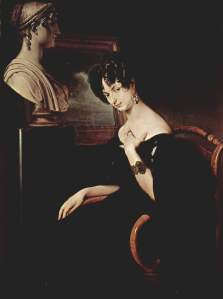
Cristina Trivulzio Belgiojoso - 1832 painting by Francesco Hayez In 1838, she had a daughter, Mary. The natural father was certainly not her estranged husband, It has been speculated that he may have been her friend Francois Mignet or her personal secretary Bolognini.
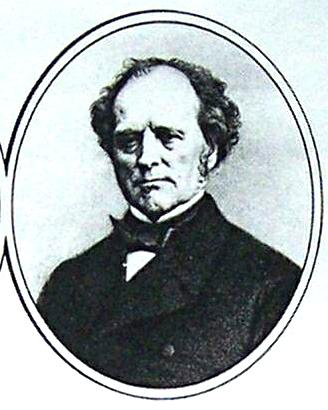 mignet
mignetIn the 1848 Italian revolutions, she organized and financed a troop of soldiers and fought in the Milanese uprising against the Austrians for Italy's independence . After the insurrection failed, she returned to Paris and published articles in the influential magazine Revue des Deux Mondes describing the struggle in Italy.

In 1849 she returned to Italy to support the Roman Republic formed in the Papal States by Mazzini and others. She became a hospital director during the brief life of the republic until it was suppressed by French troops.

Villa Litta Milano where Cristina spent much time. Now ruined after being taken over by the council of affori
Cristina fled, accompanied by her daughter, first to Malta and then to Constantinople, from where she published an account of the republic and its fall in the French magazine Le National in 1850. She brought land in the remote Ciaq-Maq-Oglou area and then traveled to Syria, Lebanon and Palestine.

Cristina published accounts of her experiences in the orient and found the condition of women there particularly disturbing. She published Of Women's Condition and of their Future (1866) in which she argues that deprived of education, women come to accept the oppressive conditions in which they find themselves.
 Locate Locate in Triulzi which Cristina loved above all other places .Now a 20th century nightmare dump on the outskirts of Milan
Locate Locate in Triulzi which Cristina loved above all other places .Now a 20th century nightmare dump on the outskirts of MilanShe lived in exile in Turkey for eight years before returning to Italy in 1856 and working with the statesman Camillo Benso Cavour for Italian unification which was achieved in 1861.
 her palace in locate
her palace in locateIn 1858 her estranged husband Emilio still legally her spouse died. A few years later she was finally able to legitimize her daughter, Mary.
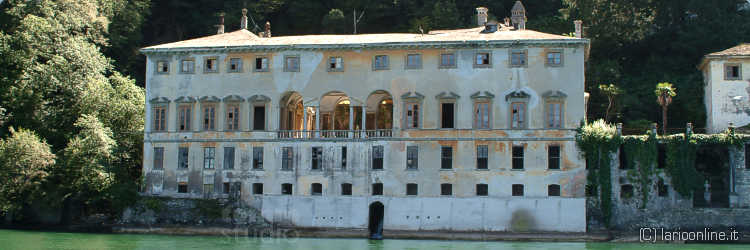
Her final years were spent in retirement between Milan and Lake Como in the company of her daughter and son-in-law, Marquis Ludovico and her English governess Miss Parker, and her Turkish servant, a freed slave. During this period she continued to write and publish until her death at age 63.She was buried at Locate and left her villa for the use of the community. In 1971, Charles Neilson Gattey reported that her villa was currently divided into apartments and occupied by over twenty families, showing Cristina’s continuing dedication to help the working class. It has now been ruined by the council after they took it over as a base.
 belgioso station in Pavia
belgioso station in Pavia


Hi,
ReplyDeletegreat photos as usual on your blog! The Prussian cavalry uniform you show is from the Bavarian army museum in Ingolstadt and I am sorry to say it is a 1809 infantry-uniform of the 13th regiment.
All the best
Uwe